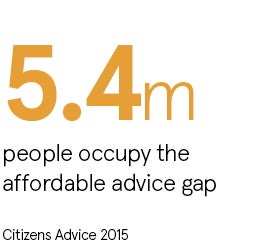For too long, mystery and mistrust have dogged the financial services industry. As a result, consumers still struggle to understand what constitutes advice, what they’re paying for and whether it is suitable for them.
In an era where we’re growing older, but worryingly saving less, we urgently need to make regulated financial advice simple to understand and accessible to everyone, regardless of income or savings pot.
Online advice has the potential to fill the advice gap and provide access to these services to the large swathe of population for whom traditional channels are too expensive or too exclusive.
However, this does not mean they should come to expect a second-rate service. There should be no difference between the services provided online and those expected from a face-to-face adviser, and customers should not be afraid to ask questions before selecting an online platform.
Is investing right for me and if so, which is the best product for my circumstances?
Alarmingly, around a quarter of people have no savings at all for a rainy day and the average person in the UK owes £8,000, on top of any mortgage debt. Providing appropriate advice is key to offering a service that meets the customer’s individual needs. This can mean telling them not to invest if they don’t yet have their financial foundations in place.
Advice should not only cover proposed investment strategies, but also the potential risks. The customer should be able to say they are fully aware of the potential outcomes, positive or negative.

How much does the service cost and what will I get for this?
Navigating the complexity of different fees and charges can be a minefield for savers. Firms still have a long way to go when it comes to fee transparency. Customers need to understand exactly what they are paying for and what the fee includes, as well as whether there is a chance of it increasing further down the line.
The best way to do this would be to banish multiple fee structures altogether. A simple all-in cost disclosed immediately on advice being given or an account opened would make it much easier for people to understand what they’re paying for, as well as to compare costs.
Are there human advisers available?
Customers must consider whether their needs can be met by a digital-only
offering. Combining online with a human element can be a valuable tool in providing reassurance or validation when it’s needed. It also helps to serve customers who have more complex needs or whose circumstances may change.
What happens if I want to access my money?
Sometimes life can throw a curveball and an element of flexibility is key when it comes to investing money. While most platforms and advisers can allow almost immediate access to your investments for a fee, there are many “exotic” investments that have restrictions on when you can withdraw your money, sometimes after several years.
Before choosing a platform, it is worth finding out how long your money needs to be in your account before you can access it early and how much it is likely to cost you to do so.
Who is responsible for the decisions made?
Worryingly, many online services are simply execution only, focused on managing assets regardless of whether the customer should actually be investing at all or whether the product, and the investment risk, is right for them.
Online advice is an undoubtedly exciting development, but to be truly successful, firms must offer a proposition which engages with customers and a service that meets their unique needs.
For more information please visit evestor.co.uk




